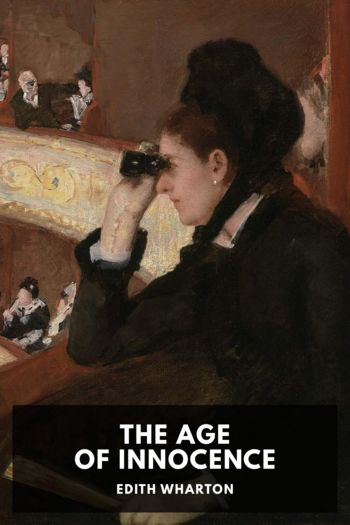The House of Mirth, Edith Wharton [series like harry potter txt] 📗

- Author: Edith Wharton
Book online «The House of Mirth, Edith Wharton [series like harry potter txt] 📗». Author Edith Wharton
Lily, going to bed early, had left the couple to themselves; and it seemed part of the general mystery in which she moved that more than an hour should elapse before she heard Bertha walk down the silent passage and regain her room. The morrow, rising on an apparent continuance of the same conditions, revealed nothing of what had occurred between the confronted pair. One fact alone outwardly proclaimed the change they were all conspiring to ignore; and that was the nonappearance of Ned Silverton. No one referred to it, and this tacit avoidance of the subject kept it in the immediate foreground of consciousness. But there was another change, perceptible only to Lily; and that was that Dorset now avoided her almost as pointedly as his wife. Perhaps he was repenting his rash outpourings of the previous day; perhaps only trying, in his clumsy way, to conform to Selden’s counsel to behave “as usual.” Such instructions no more make for easiness of attitude than the photographer’s behest to “look natural”; and in a creature as unconscious as poor Dorset of the appearance he habitually presented, the struggle to maintain a pose was sure to result in queer contortions.
It resulted, at any rate, in throwing Lily strangely on her own resources. She had learned, on leaving her room, that Mrs. Dorset was still invisible, and that Dorset had left the yacht early; and feeling too restless to remain alone, she too had herself ferried ashore. Straying toward the Casino, she attached herself to a group of acquaintances from Nice, with whom she lunched, and in whose company she was returning to the rooms when she encountered Selden crossing the square. She could not, at the moment, separate herself definitely from her party, who had hospitably assumed that she would remain with them till they took their departure; but she found time for a momentary pause of enquiry, to which he promptly returned: “I’ve seen him again—he’s just left me.”
She waited before him anxiously. “Well? what has happened? What will happen?”
“Nothing as yet—and nothing in the future, I think.”
“It’s over, then? It’s settled? You’re sure?”
He smiled. “Give me time. I’m not sure—but I’m a good deal surer.” And with that she had to content herself, and hasten on to the expectant group on the steps.
Selden had in fact given her the utmost measure of his sureness, had even stretched it a shade to meet the anxiety in her eyes. And now, as he turned away, strolling down the hill toward the station, that anxiety remained with him as the visible justification of his own. It was not, indeed, anything specific that he feared: there had been a literal truth in his declaration that he did not think anything would happen. What troubled him was that, though Dorset’s attitude had perceptibly changed, the change was not clearly to be accounted for. It had certainly not been produced by Selden’s arguments, or by the action of his own soberer reason. Five minutes’ talk sufficed to show that some alien influence had been at work, and that it had not so much subdued his resentment as weakened his will, so that he moved under it in a state of apathy, like a dangerous lunatic who has been drugged. Temporarily, no doubt, however exerted, it worked for the general safety: the question was how long it would last, and by what kind of reaction it was likely to be followed. On these points Selden could gain no light; for he saw that one effect of the transformation had been to shut him off from free communion with Dorset. The latter, indeed, was still moved by the irresistible desire to discuss his wrong; but, though he revolved about it with the same forlorn tenacity, Selden was aware that something always restrained him from full expression. His state was one to produce first weariness and then impatience in his hearer; and when their talk was over, Selden began to feel that he had done his utmost, and might justifiably wash his hands of the sequel.
It was in this mind that he had been making his way back to the station when Miss Bart crossed his path; but though, after his brief word with her, he kept mechanically on his course, he was conscious of a gradual change in his purpose. The change had been produced by the look in her eyes; and in his eagerness to define the nature of that look, he dropped into a seat in the gardens, and sat brooding upon the question. It was natural enough, in all conscience, that she should appear anxious: a young woman placed, in the close intimacy of a yachting-cruise, between a couple on the verge of disaster, could hardly, aside from her concern for her friends, be insensible to the awkwardness of her own position. The worst of it was that, in interpreting Miss Bart’s state of mind, so many alternative readings were possible; and one of these, in Selden’s troubled mind, took the ugly form suggested by Mrs. Fisher. If the girl was afraid, was she afraid for herself or for her friends? And to what degree was her dread of a catastrophe intensified by the sense of being fatally involved in it? The burden of offence lying manifestly with Mrs. Dorset, this conjecture seemed on the face of it gratuitously unkind; but Selden knew that in the most one-sided matrimonial quarrel there are generally counter-charges to be





Comments (0)